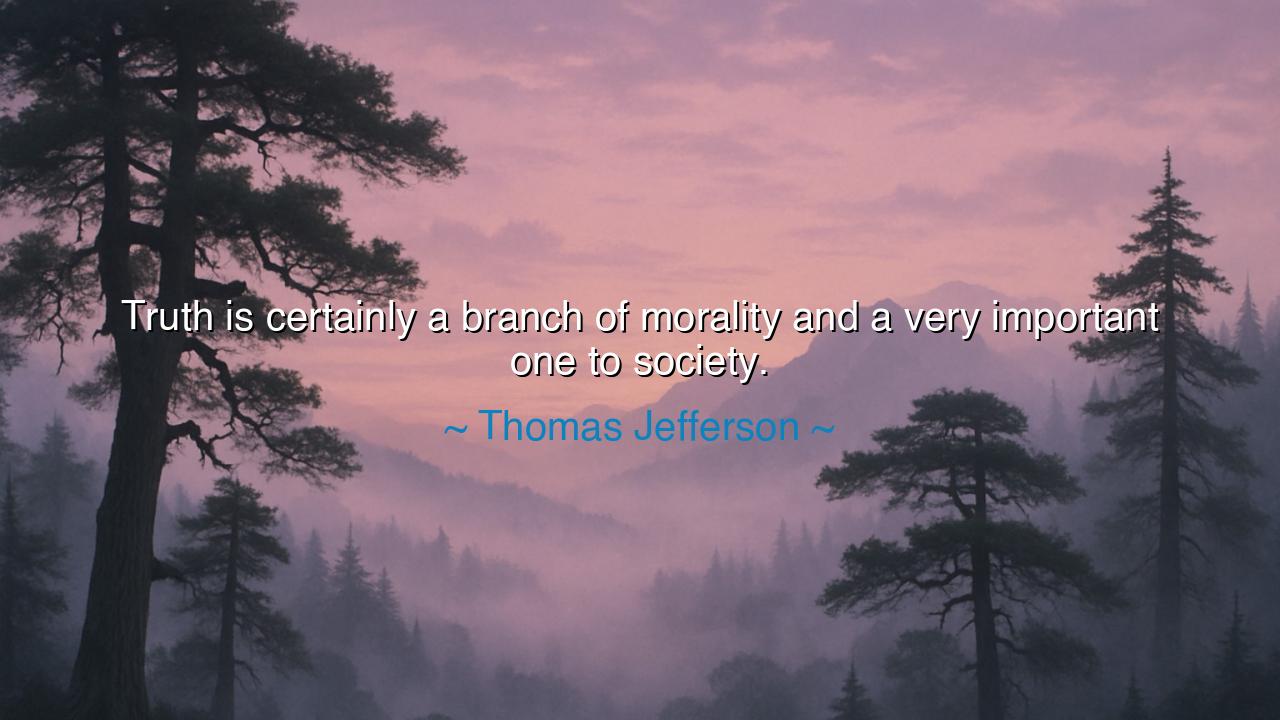
Truth is certainly a branch of morality and a very important one






Thomas Jefferson, a founding voice of a young republic, once declared: “Truth is certainly a branch of morality and a very important one to society.” These words, though spoken centuries ago, strike with the same force today, for they remind us that truth is not simply an ornament of philosophy, nor a luxury for scholars, but the very foundation upon which justice, liberty, and community stand. Without truth, morality collapses; without morality, society crumbles.
The meaning of Jefferson’s words lies in the union of truth and morality. Morality without truth is hypocrisy, a mere mask worn to conceal corruption. Truth without morality becomes cruelty, knowledge wielded without conscience. Jefferson’s wisdom is that the two must stand together: truth as the compass, morality as the path. And when a people walk in both, the society is upheld, made strong against the storms of deceit and tyranny.
History provides us with stark lessons in this matter. Consider the fate of the Soviet Union, a mighty empire built not upon truth but upon propaganda and fear. Lies were told as policy, and citizens were forced to repeat them until even reality itself seemed uncertain. For a time, the illusion held, but without truth, the empire’s morality rotted, and without morality, its society decayed. When the lies grew too heavy, the structure collapsed. Here we see Jefferson’s warning made flesh: to abandon truth is to abandon the very root of strength.
Contrast this with the story of the American civil rights movement. Leaders like Martin Luther King Jr. wielded truth as a weapon more powerful than any sword. They declared, against the lies of racism and segregation, that all men are created equal. This truth was not new, but it was buried under prejudice. By speaking it, by living it, by demanding that morality rise to meet it, King and his companions stirred the conscience of a nation. It was not numbers or weapons that gave them victory, but their unwavering hold upon the branch of truth that Jefferson himself had once cherished.
Jefferson’s own age was not without contradictions. Though he spoke of liberty and truth, he lived within a world of slavery and inequality. Yet this makes his statement all the more weighty. It is as if he knew, even in his own frailty, that the health of a society depends upon the extent to which it faces its truths—whether noble or shameful. To ignore truth, to silence it, is to plant seeds of destruction within the soil of a nation. To honor it is to prepare the ground for justice and flourishing.
The lesson for us is unchanging: cherish truth, even when it wounds. For truth is not the enemy of peace but its condition. A family built upon lies will fracture; a government built upon deceit will fall; a society that denies truth will lose its way. Truth, though sometimes harsh, is the medicine that restores the soul. It is the branch of morality upon which all other virtues—justice, compassion, freedom—must rest.
Practical action is demanded of us. Speak the truth, even when silence would be easier. Defend truth in your workplace, your community, your nation, for every lie permitted weakens the moral fabric. Support leaders who honor honesty, and hold accountable those who trade in deception. Teach children not only to seek facts but to live truthfully, for in them lies the seed of tomorrow’s society.
So let Jefferson’s words echo in your heart: “Truth is a branch of morality and a very important one to society.” Live by them, and you will not only guard your own soul, but strengthen the pillars of your people. For truth is light, and where it shines, darkness cannot prevail. And a society built upon truth, though tested by trials, will endure as long as men and women are willing to stand within its radiance.






AAdministratorAdministrator
Welcome, honored guests. Please leave a comment, we will respond soon